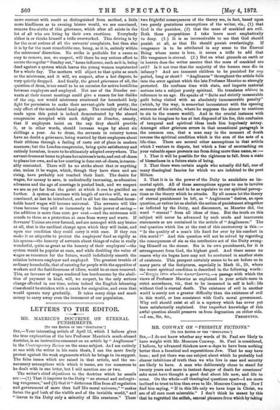LETTERS TO THE EDITOR.
MR. MAURICE'S DOCTRINE ON ETERNAL PUNISHMENTS.
[TO THE EDITOR OF THE "SPECTATOR"] SIR,—Your interesting article of April 13, which I believe gives the true explanation of the late Professor Maurice's much-abused doctrine, is an instructive comment on an article by " Anglicanus " in the Contemporary Review on the same subject. As I am entirely at one with the writer in his main thesis, I can the more freely protest against the weak arguments which he brings in its support. The false issues which are raised in that article, and the un- necessary assumptions with which it teems, are too numerous to be dealt with in one letter, but I will mention one or two.
The writer's chief objections to the doctrine which he assails are :—(1) That it imputes to the Deity " an eternal and unforgiv- ing vengeance," and (2) that it " dethrones Him from all regulation and government of more than half His moral universe," " makes Satan the god both of the visible and of the invisible world," and "leaves to the Deity only a minority of His creatures." These
two frightful consequences of the theory are, in fact, based upon two purely gratuitous assumptions of the writer, viz., (1) that God is the punisher, (2) that the mass of mankind are evil. Both these propositions I take leave most emphatically to deny. (1.) It is as inconceivable to me that God should punish at all, as that He should punish everlastingly. If vengeance is to be attributed in any sense to the Eternal Being whose name is love, it seems a trifle to add that His vengeance is eternal. (2.) But on what grounds on earth or in heaven does the writer assume that the mass of mankind are evil? Is it not true that the majority of the human race die in infancy? And are innocent children to be punished for any period, long or short ? "Anglicanus" throughout the article falls into the error against which the late Professor Maurice so strongly protested. He confuses time with state, and imports material notions into a subject purely spiritual. He translates aiD5FlO; in reference to an age. He speaks of " finite and strictly measurable guilt being visited with an absolutely immeasurable penalty" (which, by the way, is somewhat inconsistent with the opening sentences of his article, where he supposes the sinner to continue to sin in the unseen world). And in the crucial instance with which he imagines he has at last disposed of his foe, this confusion of temporal and spiritual ideas leads him hopelessly astray. Amongst other grievous errors in that sensational paragraph is the common one, that a man may in the moment of death reverse the spiritual condition which is the sum of the acts of a life-time. There are several other assumptions in that article which I venture to dispute, but which a fear of encroaching on your valuable space prevents me from doing more than name, as :- 1. That it will be possible for the righteous to fall, from a state of blessedness in a future state of being.
2. That there were certain angels who actually did fall, one of many theological fancies for which we are indebted to the poet Milton.
3. That it is in the power of the Deity to annihilate an im- mortal spirit. All of these assumptions appear to me to involve as many difficulties and to be as repulsive to our spiritual percep- tions as the theory which he attacks. By all means let the theory of eternal punishment be left, as " Anglicanus" desires, an open question, or rather let us abolish the notion of punishment altogether as inflicted by the Deity, and disconnect, as Maurice did, the word " eternal " from all ideas of time. But the truth on this subject will never be advanced by such crude and inaccurate statements as are contained in the article of "Anglicanus." The real question which lies at the root of this controversy is this :— " Is the quality of a man's life fixed for ever by his conduct in this world ?" And this question will not be solved by regarding the consequences of sin as the retributive act of the Deity aveng- ing Himself on the sinner. Sin is its own punishment, for it is estrangement from God, the highest good. And there seems no reason why sin begun here may not ba continued in another state of existence. This prospect certainly seems to be set before us in many parts of the Scriptures, especially in Mark iii., 29, where the worst spiritual condition is described in the following words : —"Evozo; EUr,v atcoviou it.,a,aprn,auroc,—a passage with which the views of Professor Maurice as explained in your article seem in strict accordance, viz., that to be immersed in self is hell : life without God is eternal death. The existence of evil in another world is surely not a greater difficulty than the existence of evil in this world, or less consistent with God's moral government. Why evil should exist at all is a mystery which has never yet been satisfactorily explained. Our imperfect knowledge of this awful question should preserve us from dogmatism on either side.


































 Previous page
Previous page